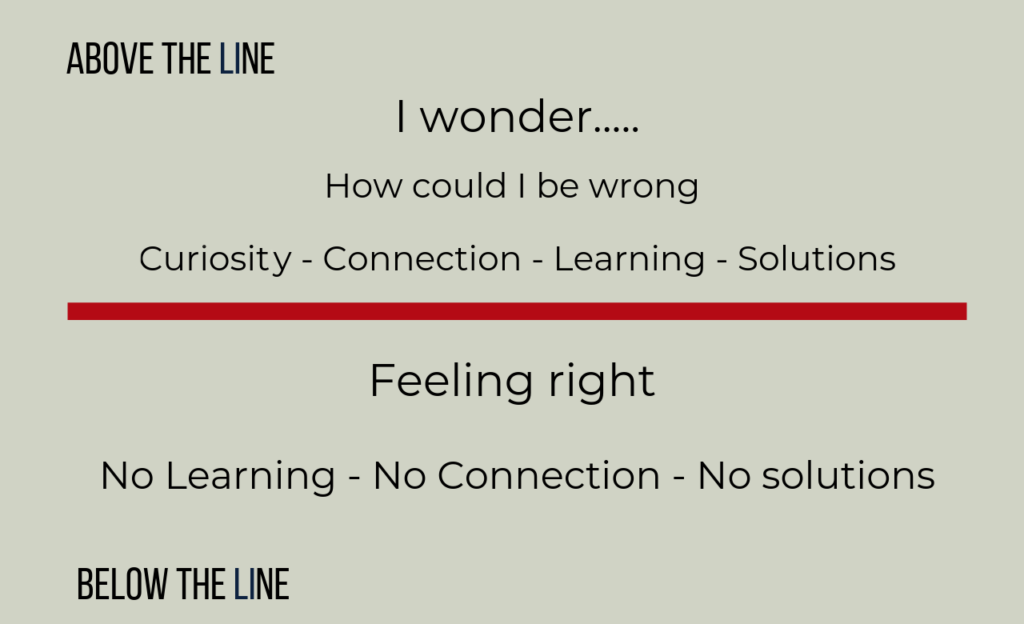Have you ever had this feeling of just knowing that you are right?
Well, I have some interesting news for you. It is just that, a feeling. An emotion, in the same category as anger or love and likewise it has no connection to reason.
When you have this feeling about just how right you are – you could just as well be wrong. In a complex world there are not many simple answers.
You may not realise it but this feeling that you are right comes with some serious consequences for your role as a team leader.
Below is the video version and below that the text version – whatever works best for you:
Leadership skills series
In my previous blog posts, we started to explore this model that we call above and below the line and we looked at the disadvantages of being below the line.
Just to recap: Below the line, we are in a reactive defensive position where it’s more about our own survival, the survival of our ego than anything else. There is no learning and we are closed to new ideas.
It’s not the best place to be, when as team leaders we are trying to create followership or build relationships with other people.
Feeling is not thinking
Now, pause and digest this for a moment. When you have this feeling of being right, it is not the result of a careful thought process. It’s just a feeling.
And only when someone challenges your ‘rightness’, will you perform a post feeling rationalisation and come up with arguments that supports your original feeling.
Your sense of being right about something, the sparkling clarity of certainty, is not a thought process, not a reasoning process, but an emotion that has nothing to do with whether you are right or not.
Jennifer Garvey Berger
Ah, you will say but when I tell you that 2+2 is 4 then I am right and it’s not a feeling it’s fact! Yep – the problem here is that people will not challenge you on what is to all an accepted fact. They will challenge the complex stuff that you feel so sure about but which is possibly not as simple as you think feel. I will post some reference at the end where you can read more. It’s fascinating stuff in my view.
Defend your rightness and dive below the line

The reason this is intersting from a team leader’s perspective is that when we give in to that feeling of being right we also automatically shift down below the line. We desperately want to defend our ‘rightness’ and the more insecure we are in our leadership role the harder we will defend our rightness. As a result we become reactive, defensive and ego driven.
This is what Jennifer Carvey Berger in her wonderful book, “Unlocking Leadership Mindtraps: How to Thrive in Complexity” calls falling into a mindtrap.
Caught in this mind trap we are in a really toxic unconstructiv place and the sooner we get out of it the better.
How do we do that?
The magic question you need to ask yourself
The first step is to be aware. You must actually notice that, this is what is happening. As soon as you register yourself moving into this pattern of rightness, then all your alarm bells should go off and you should try and stop the process. The way you do that is by awakening your own curiosity.
The easiest way to do that is to ask yourself a question beginning with :
I wonder…
- … why they disagree with me?
- … what am I missing here?
- … what does she know that I maybe don’t?
Jennifer Carvey Berger says, you could ask yourself the key question: ( I wonder) How could I be wrong?
It works like magic.
When you have the courage to question your own knowing you also have the key to shift yourself back up above the line. You awaken your curiosity, you awaken your ability to learn and you start engaging with others without the defensive boundaries you otherwise would have erected.
Chances are you will learn something that would have been completely lost if you’d stayed stuck down below the line.
There is much more to discover below the line
So I hope this week’s post has inspired you to try and catch yourself feeling right and to experiment with asking yourself, “I wonder… “
Next week I’m going to explore with you what else is going on below the line. Besides just wanting to defend being right there is a whole swamp of toxic emotions that are activated automatically and they are not helpfull at all.
Reading that might inspire you:
Jennifer Garvey Berger: “Unlocking Leadership Mindtraps: How to Thrive in Complexity”
Jim Dethmer, Diana Chapman, and Kaley Klemp: “The 15 Commitments of Conscious Leadership: A New Paradigm for Sustainable Success”
Previous blog posts in this series on Team Leadership Skills and working above and below the line:
Leadership skills every team leader needs to master
As a leader do you have the courage to examine your mindset model?